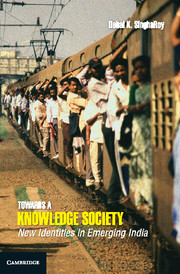Book contents
- Frontmatter
- Contents
- List of Tables and Figures
- Preface
- 1 Introduction: Conceptualising Knowledge Society: Critical Dimensions and Ideal Image
- 2 Critiquing and Contextualising Knowledge Society
- 3 Strategising for Knowledge Society in India: The Shifting Backdrops and Emerging Contexts
- 4 Education for Knowledge Society in India
- 5 Information and Communication Technologies for Knowledge Society
- 6 Indian Growth Story: Service and Knowledge Dynamics
- 7 Education, ICTs and Work: The Divergent Empirical Reality
- 8 Knowledge Society: Work, Workers and Work Relations
- 9 Knowledge Society: Culture, Continuity and Contradictions
- 10 Conclusion: Marginality, Identity, Fluidity and Beyond
- Bibliography
- Index
6 - Indian Growth Story: Service and Knowledge Dynamics
Published online by Cambridge University Press: 05 August 2014
- Frontmatter
- Contents
- List of Tables and Figures
- Preface
- 1 Introduction: Conceptualising Knowledge Society: Critical Dimensions and Ideal Image
- 2 Critiquing and Contextualising Knowledge Society
- 3 Strategising for Knowledge Society in India: The Shifting Backdrops and Emerging Contexts
- 4 Education for Knowledge Society in India
- 5 Information and Communication Technologies for Knowledge Society
- 6 Indian Growth Story: Service and Knowledge Dynamics
- 7 Education, ICTs and Work: The Divergent Empirical Reality
- 8 Knowledge Society: Work, Workers and Work Relations
- 9 Knowledge Society: Culture, Continuity and Contradictions
- 10 Conclusion: Marginality, Identity, Fluidity and Beyond
- Bibliography
- Index
Summary
The economic fundamentals of India that was guided by a socialist and welfare state philosophy, institutionalised centralised planning, state-controlled industrialisation and market mechanisms and a strategic framework of mixed economy till the 1980s bore witness to a paradigm shift since the 1990s in the wake of introduction of economic neoliberalisation by the state. Such a paradigm shift in the nature of the state has been accompanied by dismantling of state control on market mechanism, opening up gates for multinational and foreign investment in domestic market and articulation of public—private partnership for mobilisation of resources and execution of plans and policies of the state. The society has also simultaneously experienced fast expansion of educational arrangements and Information and Communication Technology (ICT) networks, increasing flow of goods and services, movement of migrant workforce and their interactions across the globe. This neoliberal economic framework has brought about speedy transformation in organisation of production through economic integration with global market forces, increasing occupational diversification, fast rate of economic growth, on the one hand; it has also generated a host of anomalies and inconsistencies by retaining poverty, unemployment, casualisation and informalisation in work participation, livelihood/food insecurity, social and spatial divides for a vast section of people, on the other. This chapter besides discussing the economic development and the anomalies arising out of it also positions the process of emergence of knowledge economy of India and the related economic dynamics arising out of it at a macro level.
Information
- Type
- Chapter
- Information
- Towards a Knowledge SocietyNew Identities in Emerging India, pp. 164 - 194Publisher: Cambridge University PressPrint publication year: 2014
